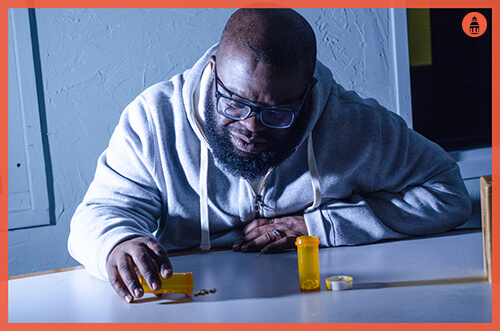Ambien is a sedative, which is sometimes also referred to as a hypnotic, used to treat sleeping disorders like insomnia for a short time. The active ingredient is zolpidem, and it acts on the brain within 15 minutes after ingestion. The tablet is designed to immediately begin releasing medication into the body as soon as it is ingested, so a doctor may prescribe the drug to be taken without food.
Because this is a strong sedative that changes brain chemistry for a specific effect, it is important to follow the prescription instructions. Also, due to its sedative effect, it’s important to notify medical professionals immediately if there are any adverse reactions, or if there are no improvements in the condition after 7-10 days have passed.
This medication was designed to initiate sleep but not to maintain sleep. Generally, medical professionals do not recommend taking Ambien for a long period of time. Taking this drug as prescribed will allow the doctor to monitor patient progress, including when the person should stop taking Ambien.

What Are the Effects of Ambien?
Ambien’s ideal effect is to help individuals sleep. While the drug does not maintain sleep, it will help the person fall asleep initially. People should only take this drug if they have set aside 7-8 hours to sleep and fully recover from the medication.
If people taking Ambien must wake up before they have had a full 7-8 hours of rest, they may suffer memory loss or other cognitive impairment. Ambien can also cause changes in thoughts, mood, or behavior, especially in people who have a history of depression or suicidal thoughts, or who have suffered addiction to other drugs.
Taking this medication can lead to worsening of depression, or cause anxiety or mood swings, aggressiveness, confusion, or hallucinations.
- Grogginess or exhaustion
- Dizziness
- Diarrhea
- Nausea or vomiting
- Headaches
- Dry mouth
- Muscle or joint pain
- Falling or fainting
- Low blood pressure
- Loss of appetite
- Slowed breathing
- Loss of coordination
Daytime grogginess or drowsiness often means that the doctor should adjust the patient’s dose. Other side effects, including allergic reactions, should be reported as soon as possible, because the doctor might take the person off the medication, or switch the person to a different medication.
People who have received prescriptions for Ambien must also inform their doctors if they take any other medications or supplements, or if they have a history of struggling with addiction. Ambien can react with other medications, alcohol, and even some vitamins or supplements.
Is Ambien Addictive? What Are the Symptoms?

Like all strong, psychiatric medications, Ambien can be habit-forming; this means that, over time, individuals may feel like they need this medication to rest or feel normal. Feeling dependent on a medication is a possible sign of addiction, and it is important to discuss this feeling with medical professionals who can help.
Ambien is intended only for short-term use, not for consistent prescriptions over a period of years. If a person feels the need to use this medication for more than a few weeks, then the individual could be suffering from a dependence on, or addiction to, the drug.
Another sign of addiction is the need to up the prescribed dose over time. Initially, a doctor may adjust a person’s prescription if the lowest possible dose has no effect, but medical professionals will always start with the lowest possible dose and adjust the medication from there. If a person with an Ambien prescription begins to develop a tolerance to the medication, it is more important for that person to discuss this change with the prescribing doctor, rather than simply taking more of the medication.
In some people, Ambien can create a euphoric effect when abused, which can fuel addiction to this medication. If an individual alters the medication in any way, such as crushing and snorting the pills; increases the dosage; takes the medication more frequently than prescribed; or mixes Ambien with alcohol or other drugs, it is a sign of abuse. Ambien abuse can quickly escalate to addiction.
When a medical professional chooses to take a patient off Ambien, or a person who has suffered an Ambien addiction chooses to stop taking the drug, the individual can expect some symptoms of withdrawal. The most common withdrawal symptom is called rebound insomnia, meaning the brain has a difficult time falling asleep without medical help. Psychological and emotional changes are also common as the person stops taking the medication, including cravings, irritability, depression, and mood swings.
If the person has taken Ambien under the supervision and direction of a medical professional, withdrawal symptoms should not last more than two days. However, for people suffering from Ambien addiction, withdrawal symptoms may last longer due to the drug’s buildup in the body.
- Stomach pain
- Panic attacks
- Flushing or feeling warm
- Lightheadedness
- Uncontrollable crying or increased depression
Is It Possible to Overdose on Ambien?
Ambien is a very strong sleep aid, and it is possible to take too much of this medication. When a person takes too much Ambien, the most common complications from overdose include slowed or depressed breathing and heart rate. The person may not wake up and could slip into a coma. Milder symptoms of an Ambien overdose include pinpoint pupils, consistent memory loss, and extreme physical exhaustion leading to unintentional sleep and collapsing. Overdose is a medical emergency, and prompt medical treatment should be sought.
A drug called flumazenil is an antagonist against Ambien and other drugs containing zolpidem. Flumazenil binds to the same receptors as zolpidem, which can prevent the brain from absorbing any more Ambien for a certain period of time. This allows emergency medical professionals enough time to assist the person suffering the overdose.
Ambien overdoses are rare, often because the drug is prescribed for use in the smallest possible effective dose. However, when people suffer from Ambien addiction, they may feel the need to take larger and larger doses because their bodies becomes more tolerant to or dependent on the medication to feel normal, and this behavior can increase the risk of overdose. People who feel like they have developed either a tolerance to or dependence on Ambien, whether or not they have a prescription for the medication, should speak to a medical professional. Treatment at an addiction rehab facility can help individuals stop abusing Ambien and achieve complete recovery.
It’s Never Too Late to Get Help
